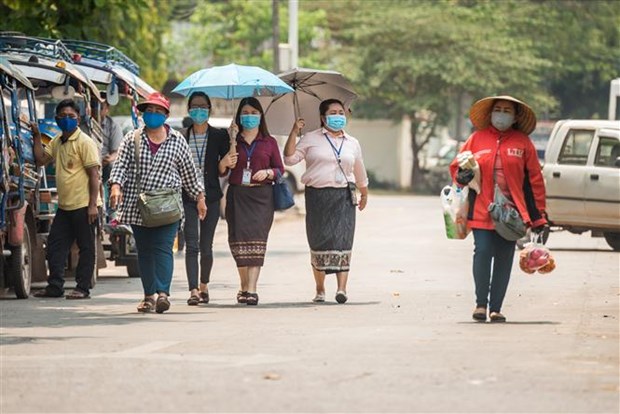Laos steps up border controls, Thailand launches “recover at home” plan
Local authorities in Laos are stepping up border controls to prevent people entering the country illegally from Thailand and avoiding screening for COVID-19.

People wear masks walking in a street in Vientiane, Laos
It is common for returning migrants to enter Laos undocumented by crossing the Mekong River at places where there are no immigration facilities. This means they are not screened for the virus or quarantined as the regulations require.
The National Taskforce Committee for COVID-19 Prevention and Control recently instructed authorities in Savannakhet, Saravan and Xayaboury provinces to record the details of people entering Laos.
These provinces are considered at high risk for the spread of the COVID-19 as they border Thailand, and the border between Laos and Thailand is porous. Laos continues to face challenges in monitoring people at border crossings and providing assistance to returning workers affected by the pandemic.
To date, 58 cases of COVID-19 have been confirmed in Laos but no deaths from the virus have been reported. A 14-day period of self-monitoring is required for everyone entering Laos even if they have no COVID-19 symptoms.
In Thailand, the Public Health Ministry has drawn up a plan to allow patients with less serious symptoms to self-quarantine at home to save hospital beds for the most serious cases.
The contingency plan aims to respond to growing concerns that hospital beds are filling up fast in the current third wave of the pandemic, and that swift action must be taken in case the situation worsens.
Under the home isolation plan unveiled on April 19, hospitals may consider allowing COVID-19 patients with no symptoms to recover at home, albeit with a number of conditions.
Hospitals will be required to follow a set of criteria when considering COVID-19 patients to self-quarantine - it is only recommended if the patients do not develop other symptoms and they would be required to self-quarantine for a full month.
Even though the home isolation system was under consideration, it is not yet necessary because about 3,000 beds were still available. So, it will not be implement this time, according to the Health Ministry.
Department of Medical Services (DMS) Director-General Somsak Akksilp said hospitalisation was still compulsory for all COVID-19 patients but that mild and asymptomatic cases, known as "Green" cases, could be sent to field hospitals and so-called "hospitels".
He said all hospitals under the ministry's supervision were being instructed to set aside ICU beds as more severe cases were anticipated this week. The DMS is working closely with medical schools in the management of ICU beds.
Thailand reported 1,443 more COVID-19 cases on April 20, raising the national count to 45,185. More four related deaths were also documented, taking the fatalities to 108./.
VNA
 Malaysia's digital economy projected to reach 31 billion USD in 2024
Malaysia's digital economy projected to reach 31 billion USD in 2024
 Opportunity to enhance the position of the Global South
Opportunity to enhance the position of the Global South
 Thailand to build new bridge to Cambodia
Thailand to build new bridge to Cambodia
 Bulgaria charts new course with Vietnam on President’s upcoming visit: Diplomat
Bulgaria charts new course with Vietnam on President’s upcoming visit: Diplomat
 Seminar seeks ways to boost ASEAN - Latin America connectivity
Seminar seeks ways to boost ASEAN - Latin America connectivity
 Indonesia seeks India's help in health education
Indonesia seeks India's help in health education
 Indonesia named world's most generous country in 2024
Indonesia named world's most generous country in 2024
 Philippines: Over-4m-high floodwaters make thousands of houses submerged
Philippines: Over-4m-high floodwaters make thousands of houses submerged
 Singapore’s public sector records carbon reduction in 2023
Singapore’s public sector records carbon reduction in 2023
 Pressure facing the EU on its growth track
Pressure facing the EU on its growth track



